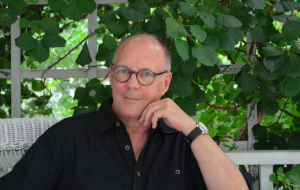“An Oboe at Night Among Trees,” a conversation about poetry with faculty member David Baker, curated by Victoria Chang (poetry ’05)

An excerpt from “An Oboe at Night Among Trees,” a conversation about poetry with faculty member David Baker, curated by Victoria Chang (poetry ’05), published by Tupelo Quarterly.
“An Oboe at Night Among Trees,” a conversation about poetry
VC: As you respond to my questions, I’m remembering how wonderful it was to be your student [I was your student at Warren Wilson twice about 15 years ago and at the Kenyon Review Writers’ Workshop]. In many of your new poems, there’s a narrative thread that travels across the poems. Is that how a poem begins for you? Via story? Or some other way?
DB: I’ve written the poems in Swift over so long a time that it’s hard to make a single summary. The oldest poems here date from 1982 or ‘83, when I was still in school. Even so I haven’t included any poems from my first book, Laws of the Land. That decision took a deep breath to make.
Poems begin for me mysteriously. Yes, sometimes there’s a kind of story I want to tell, or parts of stories. Sometimes it’s just a simple tone—like an oboe at night, among trees. I remember thinking about one poem that I wanted it to sound like that. Sometimes there’s a conundrum I want to address, a dramatic irony to enact. Sometimes I just put my speaker or thinker into motion, into circumstance, and see where he goes and what he does. I do not start a poem with the ending already in mind—or rarely. And the ending is rarely an issue of narrative, but more an issue of music, rhythm, an opening as much as a closing.
Still, I do lean toward narrative. Well, as I say that, I also hope I have some lyric skills. Those aren’t exclusive features, are they? It’s like this. I want to make a type of music out of words—lots of types of music. To play a song you have to have a story, a drama; a tone is a tone and two tones is a drama. It’s inevitable. Whenever we make a sentence, or string a couple of words together, we are already working in the realm of narrative. Language is narrative.
Now, perhaps you’re right that a narrative thread or threads do wind across my new poems. That’s inevitable, since I wrote them. I believe the most interesting threads, for any poem, are the ones we do not will to be there, the ones we don’t purposely intend, but rather the ones that show up unbidden, underneath. I’m thinking about the deeper parts of personality and psyche and imagination, where the fear and the adoration and the revulsion and the hope all hover and conspire. There’s a type of landscape that travels from poem to poem in Swift, to be sure, and a manner of being-in-the-world, and something like a voice eventually emerges.



